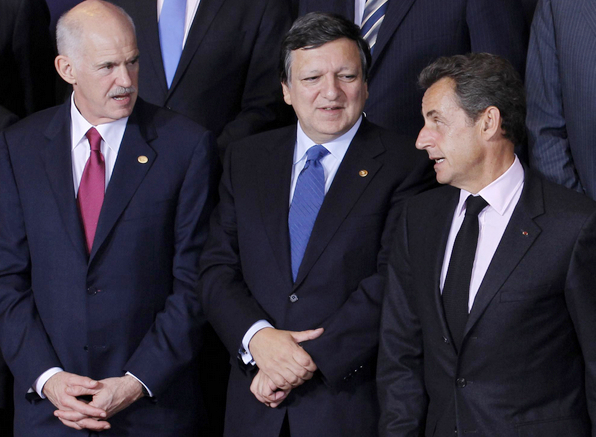Top News
Greece in deal with EU/IMF on austerity plan
Updated: 2011-06-24 09:48
(Agencies)
|
 Greece's Prime Minister George Papandreou (L), European Commission President Jose Manuel Barroso (C) and France's President Nicolas Sarkozy (R) pose during a family photo at an European Union leaders summit in Brussels June 23, 2011. EU heads of states and government are expected to take decision at their gathering in Brussels which will strengthen the stability of the euro zone, German Chancellor Angela Merkel said on Thursday. Merkel reiterated, however, no formal decisions on Greece are expected at the fourth EU summit this year.[Photo/Agencies] |
ATHENS/BRUSSELS -- European Union leaders promised more money to help Greece stave off looming bankruptcy, provided its parliament enacts an austerity plan finalised in fraught last-minute talks with international lenders.
Greek Prime Minister George Papandreou promised to push through radical economic reform after his new finance minister clinched agreement with EU and IMF inspectors on extra tax rises and spending cuts to plug a 3.8 billion euro funding gap.
"A comprehensive reform package... and adoption by the Greek parliament of the key laws on the fiscal strategy and privatisation must be finalised as a matter of urgency in the coming days," EU leaders said in a summit statement.
"This will provide the basis for setting up the main parameters of a new programme jointly supported by its euro area partners and the IMF and allow disbursement in time to meet Greece's financing needs in July," the 27 leaders said.
The euro rebounded against the dollar and U.S. stocks pared losses on news of the agreement in Athens.
Greece needs 12 billion euros in European and IMF aid to avoid a default on its debt mountain in mid-July that could spread contagion across the euro currency area and send shock waves around the world economy.
"Greece is committed, strongly committed, to continue a very important programme for major changes, radical changes, to make our economy viable," Papandreou told reporters.
The EU leaders also exhorted conservative Greek opposition leader Antonis Samaras to rally behind the austerity programme, but he stuck to his refusal to vote for the entire plan, saying he would support the spending cuts but not tax increases.
German Chancellor Angela Merkel, who has taken perhaps the toughest line on Greece, urged the Greek opposition to do what was necessary and get behind the package. "In such a situation, everyone must stand together in a country," she said.
Euro zone governments are meanwhile talking to banks and insurance companies to convince them voluntarily to maintain their exposure to Greek debt when their bonds mature, as part of a second rescue package for Athens.
RESCUE FUNDS APPROVED
The leaders also approved the creation of a permanent euro zone bailout fund from June 2013 as well a strengthening of the existing temporary rescue fund.
European Council President Herman Van Rompuy, who chaired the summit, said they would decide on Friday on the appointment of Italy's Mario Draghi to succeed Jean-Claude Trichet as head of the European Central Bank.
Van Rompuy sidestepped questions about French demands that the existing Italian member of the ECB's executive board, must step down to make way for a Frenchman.
The Greek crisis dominated debate at the summit, the fourth EU leaders have held this year as they grope for a solution to debt woes that have forced Greece, Portugal and Ireland to seek bailouts and roiled global financial markets.
Investors remain sceptical. Five-year credit default swaps on Greek government debt rose 138 basis points to 2,025 bps on Thursday, according to data monitor Markit, implying a more than 80 percent probability of default over that period.
A Greek default would force European banks and governments to take big losses, undermine the creditworthiness of other stressed euro zone sovereigns and potentially plunge the economy of the world's biggest trading bloc, already slowing, back into recession.
Economists say even a second bailout plan for Greece may buy its government only a few months' respite and most expect Athens will have to default or write down its debt eventually.
Greece accepted a package of 110 billion euros of EU/IMF loans in May 2010 and now needs a second bailout of a similar size to meet its financial obligations until the end of 2014, when it hopes to return to capital markets for funding.
Euro zone member states, led by Germany, insist any second aid package must involve the private sector. But credit rating agencies have said they would treat even a voluntary debt rollover as a selective default.
At meetings this week, banks and insurers in Germany, France, Spain, Belgium and the Netherlands were asked by national financial authorities to roll over their holdings of Greek debt when the bonds mature.
($1 = 0.698 Euros)
E-paper

Pret-a-design
China is taking bigger strides to become a force in fashion.
Preview of the coming issue
Franchise heating up
Party place
Specials

Premier Wen's European Visit
Premier Wen visits Hungary, Britain and Germany June 24-28.

My China story
Foreign readers are invited to share your China stories.

Mom’s the word
Italian expat struggles with learning English and experiences the joys of motherhood again.
